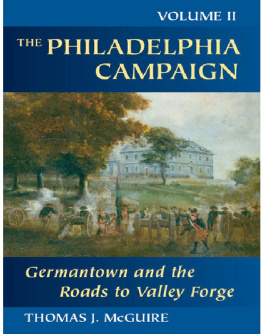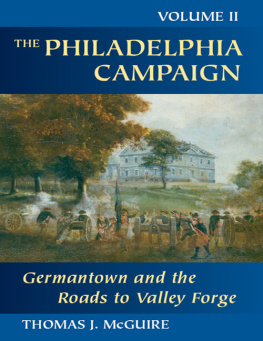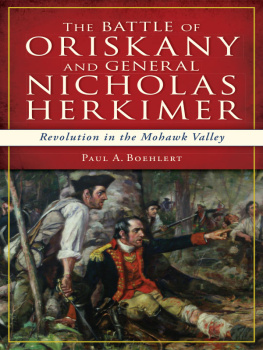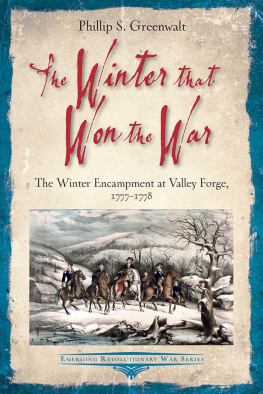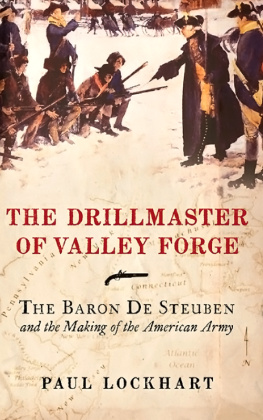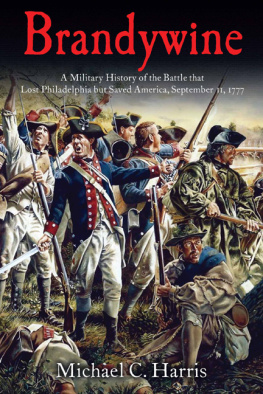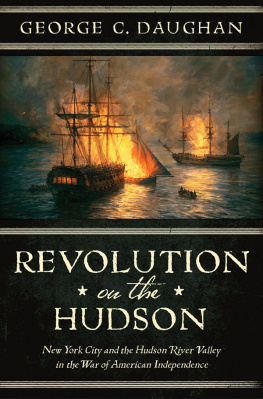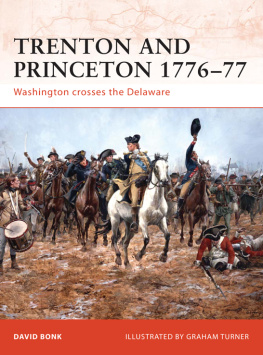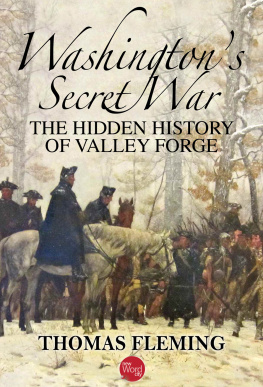The Philadelphia Campaign
The Philadelphia Campaign
VOLUME II
Germantown and the Roads to Valley Forge
THOMAS J. MCGUIRE
STACKPOLE BOOKS
Copyright 2007 by Thomas J. McGuire
Published by
STACKPOLE BOOKS
5067 Ritter Road
Mechanicsburg, PA 17055
www.stackpolebooks.com
All rights reserved, including the right to reproduce this book or portions thereof in any form or by any means, electronic or mechanical, including photocopying, recording, or by any information storage and retrieval system, without permission in writing from the publisher. All inquiries should be addressed to Stackpole Books.
Printed in the United States of America
10 9 8 7 6 5 4 3 2 1
FIRST EDITION
Volume II
ISBN: 0-8117-0206-5
ISBN-13: 978-0-8117-0206-5
Volume I
ISBN: 0-8117-0178-6
ISBN-13: 978-0-8117-0178-5
Library of Congress Cataloging-in-Publication Data
McGuire, Thomas J.
The Philadelphia Campaign / Thomas J. McGuire.
p. cm.
Includes bibliographical references and index.
ISBN-13: 978-0-8117-0178-5 (hardcover : alk. paper)
ISBN-10: 0-8117-0178-6 (hardcover : alk. paper)
1. Philadelphia (Pa.)HistoryRevolution, 1775-1783. 2. PennsylvaniaHistoryRevolution, 1775-1783Campaigns. 3. MarylandHistoryRevolution, 1775-1783Campaigns. 4. DelawareHistoryRevolution, 1775-1783Campaigns. 5. United StatesHistoryRevolution, 1775-1783British forces. 6. United StatesHistoryRevolution, 1775-1783Campaigns. I. Title.
E233.M3 2006
973.3'33dc22
2006010732
eBook ISBN: 978-0-8117-4945-9
For Susan and our Grand Union With love
ACKNOWLEDGMENTS
I would like to thank the following institutions and individuals for their assistance in this work: in the United Kingdom, the British National Archives (formerly the Public Record Office) at Kew; the Royal Artillery Library at Woolwich; the Library of Edinburgh Castle; Capt. David Horn of the Guards Museum, London; Mr. and Mrs. Oliver Russell of Ballindalloch Castle for use of the Grant Papers; Lord Howick of Howick Hall for use of Lord Cantelupe's diary; Durham University Library; the King's Map Collection at Windsor Castle, especially Martin Clayton; Sir Richard Osborn, Bt., and Sarah Saunders-Davies for their constant support, encouragement, and friendship; Col. Graeme Hazlewood of the Royal Logistics Corps; Andrew Cormack of the Journal of Army Historical Research for opening many doors, especially at the Castle, and networking with colleagues to find answers to challenging questions; Mr. John Houding; Robert Winup for his help with newspaper research; Dr. Anne Black and Uday Thakkar for their hospitality and tremendous support through years of research.
Back home, thanks are due to the American Philosophical Society; the Historical Society of Pennsylvania; the Chester County Historical Society and the Chester County Archives, especially Diane and Laurie Rofini; the Lancaster County Historical Society; the Manuscript Department and Map Department of the Library of Congress, especially Ed Redmond; Col. J. Craig Nannos (Ret., PNG/USA) and Bruce Baky, two great history colleagues; Barbara Pollarine, assistant superintendent of Valley Forge NHP, for years of friendship and help; the Clements Library, especially John Dann; the New York Public Library; the Maryland Historical Society; the Historical Society of Delaware, especially Dr. Connie Cooper for her constant help and endless good humor; Lee Boyle, former historian at the Valley Forge National Historical Park Library; Joe Seymour of the First City Troop; Don Troiani; Will Tatum; Donald Londahl-Smidt and Mark Benedict for Hessian information; Joe Rubinfine; and Sam Fore of the Harlan Crow Library for the Von Feilitzsch manuscript.
The David Library of the American Revolution at Washington's Crossing deserves special mention, not only as an extraordinary depository of primary materials on the Revolution, but also for its excellent staff, especially Meg McSweeney, Kathy Ludwig, and Greg Johnson, as well as former directors Dave Ludwig and Dave Fowler, who made working there a joy.
Thanks also to Susan Gray Detweiler for her help and kindness with the British documents in the Appendix; my good friend and mentor, David McCullough, for his enthusiasm, advice, and encouragement; my editor and friend, Kyle Weaver, for providing the opportunity to make this book a reality and a labor of love, and his team of professionals, particularly copy editor Barbara Rossi and production editor Amy Cooper, for their tireless work; and finally to my wife, Susan, to whom this book is dedicated, for putting up with it all.
Ev'n whilst we speak our Conqueror comes on,
And gathers ground upon us ev'ry Moment.
With what a dreadful Course he rushes on
From War to War: In vain has Nature form'd
Mountains and Oceans to oppose his Passage;
He bounds o'er all, victorious in his March;
Thro Winds and Waves, and Storms, he works his Way,
Impatient for the Battle: One Day more
Will set the Victor thund'ring at our Gates.
Joseph Addison, Cato, act I, scene III
PROLOGUE
F igure to yourself two large armies, the one flying from the other and both sweeping all before them, a British officer wrote home to England, describing the path of the Philadelphia Campaign and its effect on Maryland, Delaware, New Jersey, and especially Pennsylvania. Not only the present stock is destroyed, but all the young cattle, the future dependency of the province. Appalled by the effects of the war on the region, he ruefully commented, Desolation triumphs all around; nor will a century repair the loss America has already sustained in population and in commerce, burdened with debt beyond the ability of the most flourishing state in Europe to discharge.
Though he was actively engaged in crushing the American rebellion, Lt. William John Hale of the 45th Regiment of Foot could not help but marvel at the situation of the struggling American states after the fall of Philadelphia. Washington will never attempt to cover Pennsylvania, he confidently asserted, indeed it is so much exhausted as to be scarcely worth the trouble. The grenadier lieutenant had faced the Continental Army at Brandywine and witnessed the growing devastation of war firsthand through the rest of the campaign. Their commerce is almost totally ruined, and what little specie yet remains among them must be sent to foreign Nations for the purpose of prolonging a war every day of which plunges them still further in misery and ruin, Hale told his parents in the spring of 1778. The leaders have gone too far to recede, and the people, having parted with the means of freeing themselves from the tyranny of their oppressors, are obliged to submit.
And yet, this British officer saw something else, a growing spirit which seemed to be rising out of the smoke and ruin. Perhaps never was a
With General Howe's capture of Philadelphia on September 26, 1777, the third phase of the campaign that had begun in June was successfully completed by the Crown Forces. Washington's army, repeatedly outmaneuvered and defeated, had failed to stop the British invasion, and Congress had fled the city in a panic. To all outward appearances, the American Revolution was finished.
But the loss of Citys may some Times be the Salvation of States, an American officer, Col. Thomas Hartley of Pennsylvania, told his friends. Better days I doubt not will attend America but let former Misfortune be a lesson to our Statesmen. The American nation was learning the hard way that the struggle was difficult, and the toll of the fight for independence was high in lives, fortunes, and sacred honor. What we obtain too cheaply we esteem too lightly, Thomas Paine had written in his first

